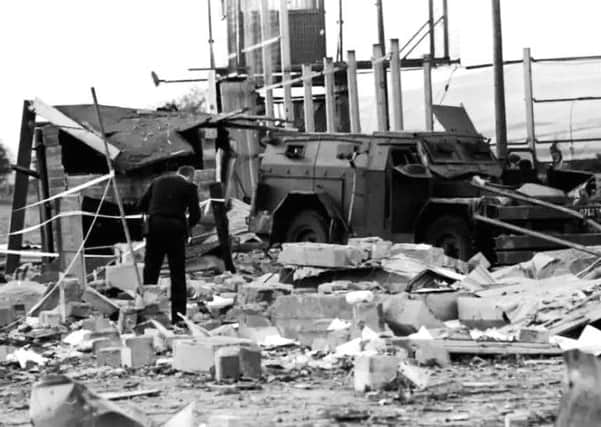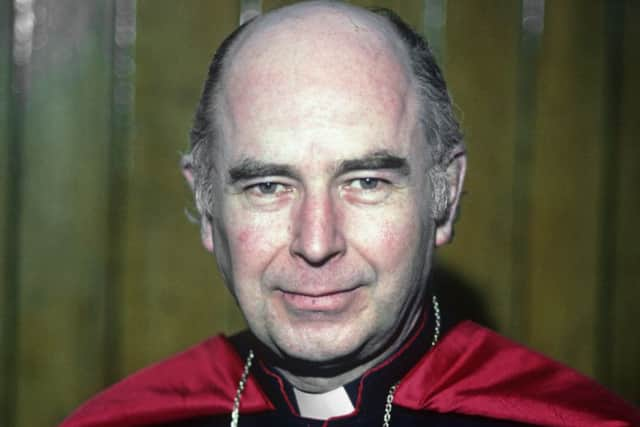Bishop Daly ‘complained bitterly’ over searches and border closures


The Bishop of Derry “complained bitterly” to Mr Brooke about roads closures at Coshquin and Strabane and wrote to the Secretary of State, as well as to the Taoiseach Charles Haughey and the RUC Chief Constable Hugh Annesley on February 15, 1991.
At the time the main Derry to Donegal border crossing at Coshquin remained closed following the IRA bombing of the British Army vehicle checkpoint on October 24, 1990, which killed six people.
Advertisement
Hide AdAdvertisement
Hide AdA formerly declassified Northern Ireland Office (NIO) file shows that Bishop Daly believed the confidence of the nationalist community in the police was deteriorating due to searches and road closures.


“Bishop Edward Daly complained on February 15, 1991, publicly and bitterly, about the level of searches of houses of members of the Roman Catholic community, in the Castlederg area in recent months,” a file written by Christine Collins of the NIO’s Security Policy and Operations Division dated April 5, 1991 states.
“He also wrote to the Secretary of State, the Chief Constable, the Divisional Commander in Londonderry, and the Taoiseach, making the same complaints of unjustifiable searches of homes and expressing no confidence - either on his own part or those of his people - in the police complaints procedures.
“He also complained of the nuisance and disruption caused by the closure of PVCP’s - in particular, the protracted closure of the road at Coshquin, following the ‘human bomb’ attack on October 24, and of the closure of Strabane/Lifford crossing at night.
Advertisement
Hide AdAdvertisement
Hide Ad“These concerns are operational matters, in which the police themselves have taken the lead. The ICPC [Independent Commission for Police Complaints] took the view that the ‘complaints’ detailed by the Bishop arose from operational policy rather than from misconduct by police officers, and accordingly were not a matter for it,” adds Collins.
The file shows Bishop Daly met with the Divisional Commander of the RUC in February and reiterated his view that “very respectable Roman Catholic people had suffered the highly intrusive experience of having their homes searched”.
But, “the police explained that they could not simply sit back and let the campaign of terrorism, which has seen some 20 people murdered in the Castlederg area over the past 20 years, continue without attempting to find those responsible.”
By the time Collins wrote her memo traffic at Coshquin was flowing again as freely as it could at an army checkpoint.
Advertisement
Hide AdAdvertisement
Hide Ad“The position over the Coshquin PVCP (where work was still in progress, although it has now been re-opened to traffic) and the Strabane/Lifford PVCP was also discussed, and the Bishop seemed well satisfied with the meeting, which ended amicably,” she states.
The NIO official suggests Bishop Daly had to walk a delicate line due to the diverse views of his congregation.
“The Bishop is in a difficult position as he tries to represent, and articulate the full range of opinion - some of it highly emotional - of his flock.
“That opinion includes the forthright denunciation of PIRA delivered at the funeral of Mr Patsy Gillespie, the civilian forced to drive the bomb to Coshquin. It also includes a level of distrust of the RUC and of lack of support for counter-terrorist measures, particularly those seen as intrusive, apparently ineffectual and ‘one-sided’, such is expressed in this episode.
Advertisement
Hide AdAdvertisement
Hide Ad“Such episodes also reinforce the feelings among unionists that there is ambivalence about PIRA terrorism among the nationalist community, even from its most respected leaders,” she states.
A draft letter of response to the Bishop by the Conservative Paymaster General and Minister of State for the North of the day, John Ganzoni, or Lord Belstead as he styled himself, was drawn up in which the road closure concerns were addressed.
The letter, prepared for dispatch to Bishop’s House, reads: “Turning to your comments about the lengthy closure of the Buncrana Road (which I was glad to see re-opened on March 11), it is indeed to be regretted that it did take so long, not only to repair the very considerable damage done to the road by the explosion, but to re-build the checkpoint in a form more convenient for traffic, and to secure it to a sufficient standard to ensure that the consequences of the 24 October bomb would not be repeated. As you will recall, in the run-up to Christmas, an alternative crossing was temporarily reopened to assist the Londonderry and Donegal communities.
“I fear, however, that the extra effort this required from the security forces, and the risks to which it exposed them, could not be sustained until the main road could be reopened.”